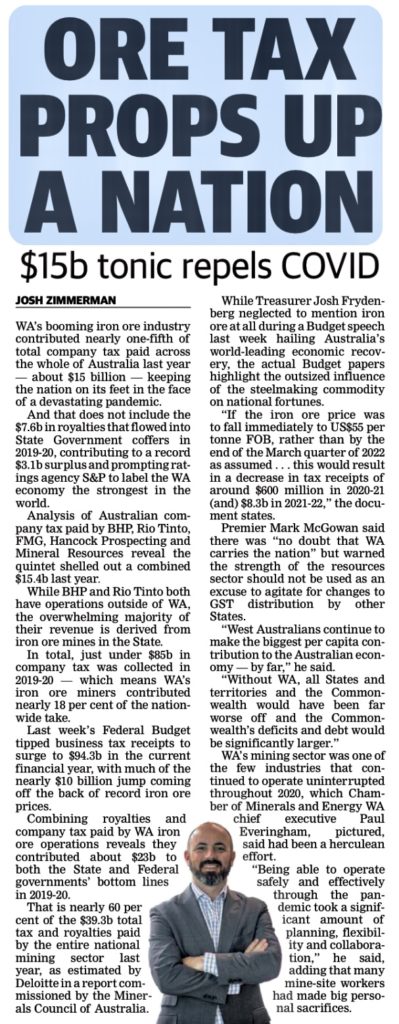Article by Josh Zimmerman courtesy of The West Australian
$15b tonic repels COVID.
WA’s booming iron ore industry contributed nearly one-fifth of total company tax paid across the whole of Australia last year — about $15 billion — keeping the nation on its feet in the face of a devastating pandemic.
And that does not include the $7.6b in royalties that flowed into State Government coffers in 2019-20, contributing to a record $3.1b surplus and prompting ratings agency S&P to label the WA economy the strongest in the world.
Analysis of Australian company tax paid by BHP, Rio Tinto, FMG, Hancock Prospecting and Mineral Resources reveal the quintet shelled out a combined $15.4b last year.
While BHP and Rio Tinto both have operations outside of WA, the overwhelming majority of their revenue is derived from iron ore mines in the State.
In total, just under $85b in company tax was collected in 2019-20 — which means WA’s iron ore miners contributed nearly 18 per cent of the nationwide take.
Last week’s Federal Budget tipped business tax receipts to surge to $94.3b in the current financial year, with much of the nearly $10 billion jump coming off the back of record iron ore prices.
Combining royalties and company tax paid by WA iron ore operations reveals they contributed about $23b to both the State and Federal governments’ bottom lines in 2019-20.
That is nearly 60 per cent of the $39.3b total tax and royalties paid by the entire national mining sector last year, as estimated by Deloitte in a report commissioned by the Minerals Council of Australia.
While Treasurer Josh Frydenberg neglected to mention iron ore at all during a Budget speech last week hailing Australia’s world-leading economic recovery, the actual Budget papers highlight the outsized influence of the steelmaking commodity on national fortunes.
“If the iron ore price was to fall immediately to US$55 per tonne FOB, rather than by the end of the March quarter of 2022 as assumed … this would result in a decrease in tax receipts of around $600 million in 2020-21 (and) $8.3b in 2021-22,” the document states.
Premier Mark McGowan said there was “no doubt that WA carries the nation” but warned the strength of the resources sector should not be used as an excuse to agitate for changes to GST distribution by other States.
“West Australians continue to make the biggest per capita contribution to the Australian economy — by far,” he said.
“Without WA, all States and territories and the Commonwealth would have been far worse off and the Commonwealth’s deficits and debt would be significantly larger.”
WA’s mining sector was one of the few industries that continued to operate uninterrupted throughout 2020, which Chamber of Minerals and Energy WA chief executive Paul Everingham, pictured, said had been a herculean effort.
“Being able to operate safely and effectively through the pandemic took a significant amount of planning, flexibility and collaboration,” he said, adding that many mine-site workers had made big personal sacrifices.

